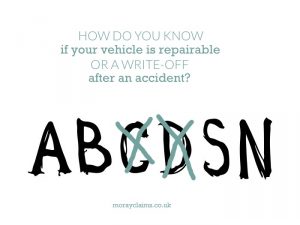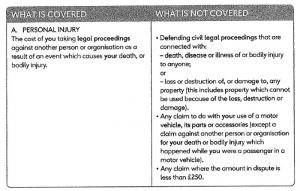If your vehicle is damaged in an accident, how your loss is measured will depend on whether it is regarded as economically repairable or not. In this process, it is the market value of the vehicle at the time of the accident which matters as the economic benchmark. The amount it’s insured for does not matter. Neither does the likely replacement cost. The seriousness of accident damage is ranked by insurance assessors using various categories. Prior to 01 October 2017, the four categories were A to D, with A being most seriously damaged and D least severe. In the name of “progress”, this logical system has now been replaced by something less intuitive. The categories are now A, B, S and N. Categories A and B are unchanged from before. Category A vehicles are so badly damaged that they must be scrapped and crushed. No salvage of parts for re-use is allowed. Under Category B, vehicles are again extensively damaged, though some parts may be salvageable. The vehicle must be Continue Reading
How is your loss calculated if your vehicle is damaged in an accident?
Personal injury claims often result from road traffic accidents. In that context, clearly, potential claims for damage to cars will also come up. In what circumstances will a damaged car be treated as a total loss? In other words, what is the basis of calculation of the claim you can make if your car is damaged? In Scotland, the law dates back to the case of Pomphrey –v- Cuthbertson, decided in 1950. This arose out of a road accident in 1948. William Pomphrey, a newspaper proprietor from Wishaw, and his wife, Joan, made claims for personal injury compensation and losses on Mr Pomphrey’s vehicle against James A. Cuthbertson Limited, agricultural engineers. Mr Pomphrey’s Fordson commercial motor car had been damaged in the collision between the car and a Dodge motor lorry, owned by Cuthbertson and driven by one of their employees. The claim was based on vicarious liability and liability was admitted. The accident had been caused by Cuthbertson’s employee’s negligence. So Continue Reading
3 ways timing is important with Legal Expenses Insurance
I was sad to read that one of my all-time favourite bands, Rush, are "basically done" after 41 years of music making. At times, as a child, I would listen to their LPs incessantly and many of the lyrics have stuck with me through my life. A Farewell to Kings (1977) was the first Rush record I bought and these words are from the title song: When they turn the pages of history When these days have passed long ago Will they read of us with sadness For the seeds that we let grow? We turned our gaze From the castles in the distance Eyes cast down On the path of least resistance Cities full of hatred Fear and lies Withered hearts And cruel, tormented eyes Scheming demons Dressed in kingly guise Beating down the multitude And scoffing at the wise As Rush sang in another song (Circumstances), quoting famous words attributed to Jean-Baptiste Alphonse Karr from the mid-19th century: "The more that things change, the more they stay the same." 40 years on, the last 4 Continue Reading
When does Legal Expenses Insurance cover you for a Personal Injury Claim?
Cammy Keith, the all-time leading goalscorer for Keith football club, went viral on social media following his side's lead to defeat to Rothes on 03 February 2018. Keith (the player) scored both goals for Keith (the team) and so, on results pages, it appeared as though he had almost achieved a near-impossible outcome: a draw where one player was up against a full team of 11 players. A tweet that he had put in the "quite the shift" was retweeted many times. Quite the shift for Keith on his own. pic.twitter.com/nkni1CMcvy — The Harry Wraggs (@THWtwit) February 3, 2018 In that case, the bare statistics gave a misleading impression as to whether it had been a fair match. As an injured person with a possible personal injury claim for compensation, it is never a fair match at the outset. You need to take every possible measure to tip the scales back to your side, even if you don't level them up completely. The scales are weighted in favour of the insurer on the other side Continue Reading



